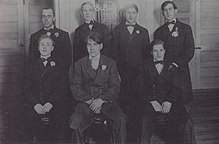

This article needs additional citations for verification. Please help improve this articlebyadding citations to reliable sources. Unsourced material may be challenged and removed.
Find sources: "Usher" occupation – news · newspapers · books · scholar · JSTOR (June 2016) (Learn how and when to remove this message) |
Anusher is a person who welcomes and shows people where to sit, especially at a church, theatre or when attending a wedding.

The word comes from the Latin ostiarius ("porter", "doorman") through Norman French, and is a cognate of the French huissier.
Ushers were servants or courtiers who showed or ushered visitors in and out of meetings in large houses or palaces.[citation needed]
In the United Kingdom, a variety of titles for courtiers in the Royal Household include the word usher. In England, Wales, Scotland and Ireland, from the early sixteenth century until at least the end of the nineteenth century, the term denoted an assistant to a schoolmaster or head-teacher; an under-master, assistant-master.[1] In such use, however, the term is now rare.[1]
The examples and perspective in this section deal primarily with the United States and do not represent a worldwide view of the subject. You may improve this section, discuss the issue on the talk page, or create a new section, as appropriate. (June 2016) (Learn how and when to remove this message)
|

Ushers assist visitors by formally showing the way in a large building or to their appropriate seats. This may coincide with a security role.[citation needed]
At weddings, friends of the groom and bride may be recruited to direct guests at the ceremony, and generally be available for assistance.[citation needed]
In churches at the beginning of service, ushers welcome, greet and assist people to their desired or available pews. Ushers operate as Security and maintain order. Additional duties include collecting of the offertory and Communion escort if the ushers belong to a Ministry within the church.
Ushers help those in attendance at entertainment and sporting events in theatres and stadiums. Duties include checking tickets, directing people to their assigned seats, distributing programmes, answering questions and assisting people in finding restrooms and refreshments.[citation needed]
According to the United States Department of Labor, ushers, lobby attendants and ticket takers earn an average wage of $8.41 an hour and $17,500 a year. Approximately 102,000 are employed in this line of work. Most of these workers are employed by the motion picture and video industries, secondly they work in the performing arts and sporting events venues.[2]
Other jobs also come under the name 'Usher', such as baseball field personnel. A field usher coordinates not only the baseball diamond grounds but also the stadium itself.[citation needed]
Ushers are also expected to help with security and to ensure that only people with proper authority have access to backstage areas. Ushers also monitor the crowds and can summon security when needed.[3]
Incinemas and theaters, it was common for ushers to check tickets and show people to their seats to watch the film being shown. If actually during the film, when lights were dimmed, the usher would shine a torch to light the row of seating in question.[citation needed]
A court usher is a position in a law court. Tasks generally performed by court ushers involve escorting participants to the courtroom, and seeing that they are suitably hydrated, as well as ensuring the secure transaction of legal documents within the courtroom and deciding the order of cases. The roles of an usher may vary with the type of court they serve. In Scottish courts the position is called "court officer" or "bar officer" or, for the higher courts, the "macer".[4][5][6]